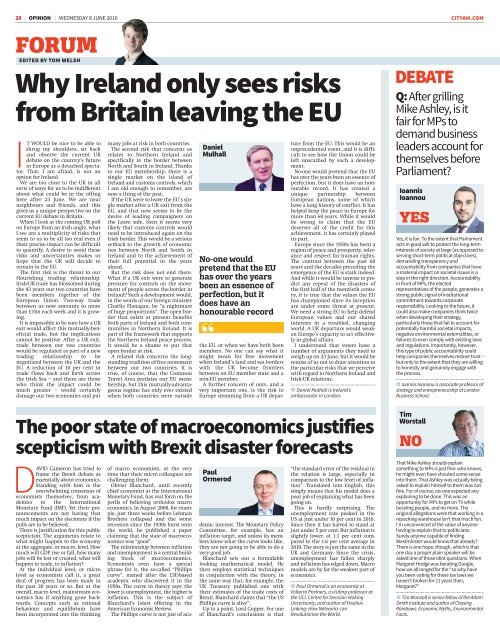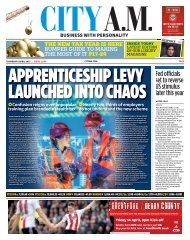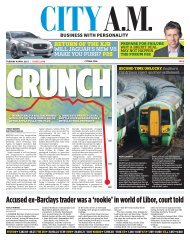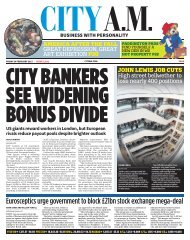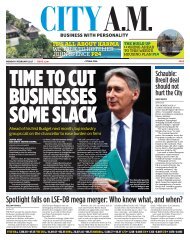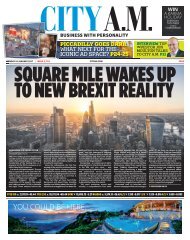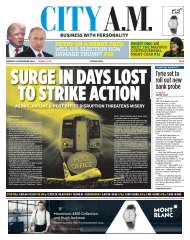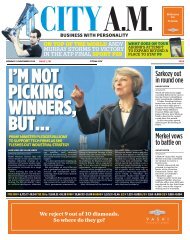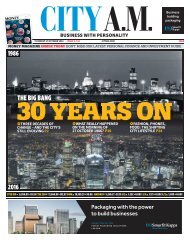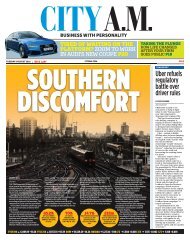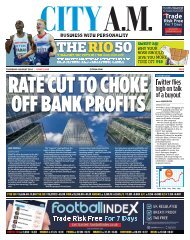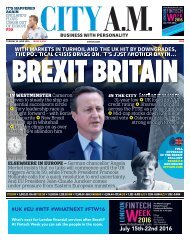SPORTS DIRECT AND TO THE POINT
cityam-2016-06-08-57575bc45f929
cityam-2016-06-08-57575bc45f929
You also want an ePaper? Increase the reach of your titles
YUMPU automatically turns print PDFs into web optimized ePapers that Google loves.
20 OPINION WEDNESDAY 8 JUNE 2016<br />
CITYAM.COM<br />
FORUM<br />
EDITED BY <strong>TO</strong>M WELSH<br />
Why Ireland only sees risks<br />
from Britain leaving the EU<br />
IT WOULD be nice to be able to<br />
shrug my shoulders, sit back<br />
and observe the current UK<br />
debate on the country’s future<br />
in Europe as a detached spectator.<br />
That, I am afraid, is not an<br />
option for Ireland.<br />
We are too close to the UK in all<br />
sorts of ways for us to be indifferent<br />
about what could be in the offing<br />
here after 23 June. We are near<br />
neighbours and friends, and this<br />
gives us a unique perspective on the<br />
current EU debate in Britain.<br />
When I look at the coming UK poll<br />
on Europe from an Irish angle, what<br />
I see are a multiplicity of risks that<br />
seem to us to be all too real even if<br />
their precise impact can be difficult<br />
to quantify. A desire to avoid these<br />
risks and uncertainties makes us<br />
hope that the UK will decide to<br />
remain in the EU.<br />
The first risk is the threat to our<br />
flourishing trading relationship.<br />
Irish-UK trade has blossomed during<br />
the 43 years our two countries have<br />
been members together of the<br />
European Union. Two-way trade<br />
between us now amounts to more<br />
than £1bn each week and it is growing.<br />
It is impossible to be sure how a UK<br />
exit would affect this mutually-beneficial<br />
trade, but the implications<br />
cannot be positive. After a UK exit,<br />
trade between our two countries<br />
would be regulated as part of a new<br />
trading relationship to be<br />
negotiated between the UK and the<br />
EU. A reduction of 10 per cent in<br />
trade flows back and forth across<br />
the Irish Sea – and there are those<br />
who think the impact could be<br />
much greater – would certainly<br />
damage our two economies and put<br />
DAVID Cameron has tried to<br />
frame the Brexit debate as<br />
essentially about economics.<br />
Standing with him is the<br />
overwhelming consensus of<br />
economists themselves, from academics<br />
to the International<br />
Monetary Fund (IMF). Yet their pronouncements<br />
are not having that<br />
much impact on the electorate if the<br />
polls are to be believed.<br />
There is justification for this public<br />
scepticism. The arguments relate to<br />
what might happen to the economy<br />
at the aggregate, or macro, level. How<br />
much will GDP rise or fall, how many<br />
jobs will be lost or created, what will<br />
happen to trade, to inflation?<br />
At the individual level, or micro<br />
level as economists call it, a great<br />
deal of progress has been made in<br />
the past 20 years or so. But at the<br />
overall, macro level, mainstream economics<br />
has if anything gone backwards.<br />
Concepts such as rational<br />
behaviour and equilibrium have<br />
been incorporated into the thinking<br />
many jobs at risk in both countries.<br />
The second risk that concerns us<br />
relates to Northern Ireland and<br />
specifically to the border between<br />
North and South in Ireland. Thanks<br />
to our EU membership, there is a<br />
single market on the island of<br />
Ireland and customs controls, which<br />
I am old enough to remember, are<br />
now a thing of the past.<br />
If the UK were to leave the EU’s single<br />
market after a UK exit from the<br />
EU, and that now seems to be the<br />
desire of leading campaigners on<br />
the Leave side, then it seems very<br />
likely that customs controls would<br />
need to be introduced again on the<br />
Irish border. This would be a serious<br />
setback to the growth of economic<br />
ties between North and South in<br />
Ireland and to the achievement of<br />
their full potential in the years<br />
ahead.<br />
But the risk does not end there.<br />
What if a UK exit were to generate<br />
pressure for controls on the movement<br />
of people across the border in<br />
Ireland? Such a development would,<br />
in the words of our foreign minister<br />
Charlie Flanagan, be “a nightmare<br />
of huge proportions”. The open border<br />
that exists at present benefits<br />
both parts of Ireland and both communities<br />
in Northern Ireland. It is<br />
part of the framework that supports<br />
the Northern Ireland peace process.<br />
It would be a shame to put that<br />
open border at risk.<br />
A related risk concerns the longstanding<br />
tradition of free movement<br />
between our two countries. It is<br />
true, of course, that the Common<br />
Travel Area predates our EU membership,<br />
but this mutually-advantageous<br />
regime has only ever existed<br />
when both countries were outside<br />
Daniel<br />
Mulhall<br />
No-one would<br />
pretend that the EU<br />
has over the years<br />
been an essence of<br />
perfection, but it<br />
does have an<br />
honourable record<br />
the EU, or when we have both been<br />
members. No one can say what it<br />
might mean for free movement<br />
when Ireland’s land and sea borders<br />
with the UK become frontiers<br />
between an EU member state and a<br />
non-EU member.<br />
A further concern of ours, and a<br />
very important one, is the risk to<br />
Europe stemming from a UK depar-<br />
of macro economists, at the very<br />
time that their micro colleagues are<br />
challenging them.<br />
Olivier Blanchard, until recently<br />
chief economist at the International<br />
Monetary Fund, has real form on the<br />
perils of believing orthodox macro<br />
economics. In August 2008, for example,<br />
just three weeks before Lehman<br />
Brothers collapsed and the worst<br />
recession since the 1930s burst onto<br />
the world, he published a paper<br />
claiming that the state of macroeconomics<br />
was “good”.<br />
The relationship between inflation<br />
and unemployment is a central building<br />
block of macroeconomics.<br />
Economists even have a special<br />
phrase for it, the so-called “Phillips<br />
curve”, named after the LSE-based<br />
academic who discovered it in the<br />
1950s. The curve in theory says: the<br />
lower is unemployment, the higher is<br />
inflation. This is the subject of<br />
Blanchard’s latest offering in the<br />
American Economic Review.<br />
The Phillips curve is not just of academic<br />
interest. The Monetary Policy<br />
Committee, for example, has an<br />
inflation target, and unless its members<br />
know what the curve looks like,<br />
they are not going to be able to do a<br />
very good job.<br />
Blanchard sets out a formidable<br />
looking mathematical model. He<br />
then employs statistical techniques<br />
in conjunction with the theory, in<br />
the same way that, for example, the<br />
UK Treasury published one with<br />
their estimates of the trade costs of<br />
Brexit. Blanchard claims that “the US<br />
Phillips curve is alive”.<br />
Up to a point, Lord Copper. For one<br />
of Blanchard’s conclusions is that<br />
ture from the EU. This would be an<br />
unprecedented event, and it is difficult<br />
to see how the Union could be<br />
left unscathed by such a development.<br />
No-one would pretend that the EU<br />
has over the years been an essence of<br />
perfection, but it does have an honourable<br />
record. It has created a<br />
unique partnership between<br />
European nations, some of which<br />
have a long history of conflict. It has<br />
helped keep the peace in Europe for<br />
more than 60 years. While it would<br />
be wrong to claim that the EU<br />
deserves all of the credit for this<br />
achievement, it has certainly played<br />
its part.<br />
Europe since the 1950s has been a<br />
region of peace and prosperity, tolerance<br />
and respect for human rights.<br />
The contrast between the past 60<br />
years and the decades preceding the<br />
emergence of the EU is stark indeed.<br />
And while it would be unwise to predict<br />
any repeat of the disasters of<br />
the first half of the twentieth century,<br />
it is true that the values the EU<br />
has championed since its inception<br />
are under some threat at present.<br />
We need a strong EU to help defend<br />
European values and our shared<br />
interests in a troubled, changing<br />
world. A UK departure would weaken<br />
Europe’s capacity to act effectively<br />
in global affairs.<br />
I understand that voters have a<br />
number of arguments they need to<br />
weigh up on 23 June, but it would be<br />
remiss of us not to draw attention to<br />
the particular risks that we perceive<br />
with regard to Northern Ireland and<br />
Irish-UK relations.<br />
£ Daniel Mulhall is Ireland’s<br />
ambassador in London.<br />
The poor state of macroeconomics justifies<br />
scepticism with Brexit disaster forecasts<br />
Paul<br />
Ormerod<br />
“the standard error of the residual in<br />
the relation is large, especially in<br />
comparison to the low level of inflation”.<br />
Translated into English, this<br />
simply means that his model does a<br />
poor job of explaining what has been<br />
going on.<br />
This is hardly surprising. The<br />
unemployment rate peaked in the<br />
US at just under 10 per cent in 2010.<br />
Since then it has halved to stand at<br />
just under 5 per cent. But inflation is<br />
slightly lower, at 1.1 per cent compared<br />
to the 1.6 per cent average in<br />
2010. The story is just the same in the<br />
UK and Germany. Since the crisis,<br />
unemployment has fallen sharply<br />
and inflation has edged down. Macro<br />
models are by far the weakest part of<br />
economics.<br />
£ Paul Ormerod is an economist at<br />
Volterra Partners, a visiting professor at<br />
the UCL Centre for Decision Making<br />
Uncertainty, and author of Positive<br />
Linking: How Networks can<br />
Revolutionise the World.<br />
DEBATE<br />
Q: After grilling<br />
Mike Ashley, is it<br />
fair for MPs to<br />
demand business<br />
leaders account for<br />
themselves before<br />
Parliament?<br />
Ioannis<br />
Ioannou<br />
YES<br />
Yes, it is fair. To the extent that Parliament<br />
acts in good will to protect the long-term<br />
interests of society at large (as opposed to<br />
serving short-term political objectives),<br />
demanding transparency and<br />
accountability from companies that have<br />
a material impact on societal issues is a<br />
step in the right direction. Accountability<br />
in front of MPs, the elected<br />
representatives of the people, generates a<br />
strong public signal of institutional<br />
commitment towards corporate<br />
responsibility. Looking to the future, it<br />
could also make companies think twice<br />
when developing their strategy,<br />
particularly those that fail to account for<br />
potentially harmful societal impacts,<br />
negative environmental externalities, or<br />
failures to even comply with existing laws<br />
and regulations. Importantly, however,<br />
this type of public accountability could<br />
help companies themselves restore trust –<br />
but only to the extent that they are willing<br />
to honestly and genuinely engage with<br />
the process.<br />
£ Ioannis Ioannou is associate professor of<br />
strategy and entrepreneurship at London<br />
Business School.<br />
Tim<br />
Worstall<br />
NO<br />
That Mike Ashley should explain<br />
something to MPs is just fine: who knows,<br />
he might even have shouted some sense<br />
into them. That Ashley was actually being<br />
asked to explain himself to them was not<br />
fine. For of course, no-one expected any<br />
explaining to be done. This was an<br />
opportunity for MPs to get on TV while<br />
berating people, and no more. The<br />
original allegations were that working in a<br />
repacking warehouse isn’t that much fun.<br />
I’m unconvinced of the value of anyone<br />
having to explain that to politicians.<br />
Surely anyone capable of finding<br />
Westminster would know that already?<br />
There is one hope, though, which is that<br />
one day a proper plain speaker will be<br />
asked one of those idiot questions. When<br />
Margaret Hodge was berating Google,<br />
how we all longed for the “so why have<br />
you been voting for these tax laws we<br />
haven’t broken for 21 years then,<br />
Margaret?”<br />
£ Tim Worstall is senior fellow of the Adam<br />
Smith Institute and author of Chasing<br />
Rainbows: Economic Myths, Environmental<br />
Facts.


